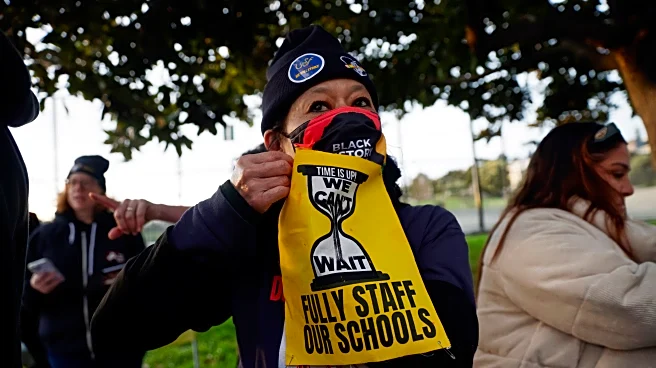What's Happening?
The Iranian Foreign Ministry has expressed concern over escalating tensions between Afghanistan and Pakistan, urging both countries to exercise self-restraint and engage in dialogue. The call comes after recent exchanges of fire across the Afghanistan-Pakistan border, following an air strike on Kabul that the Taliban attributed to Pakistan. The Taliban's Defense Ministry reported retaliatory attacks against Pakistani forces, citing repeated violations of Afghan territory. Pakistan's Interior Minister Mohsin Naqvi described the Afghan attacks as 'unprovoked' and stated that Pakistani forces were responding in kind. Iran emphasized the importance of mutual respect for territorial integrity and national sovereignty, offering to assist in easing tensions between the two nations.
Why It's Important?
The border clashes between Afghanistan and Pakistan highlight the fragile security situation in the region, with potential implications for regional stability. Iran's involvement underscores the broader geopolitical interests at play, as both Afghanistan and Pakistan are key players in South Asian politics. The conflict could disrupt trade and movement across the border, affecting local economies and communities. Additionally, the situation may influence diplomatic relations and security policies among neighboring countries, including Iran, which seeks to maintain peace in its surrounding region.
What's Next?
Iran has offered to facilitate dialogue between Afghanistan and Pakistan, aiming to prevent further escalation. The international community may also step in to mediate, given the potential for broader regional instability. Both countries have been urged to resolve disputes through diplomatic means, and future talks could focus on establishing mechanisms to prevent border violations and improve communication. The situation remains tense, and further developments will depend on the willingness of both sides to engage in constructive dialogue.
Beyond the Headlines
The conflict between Afghanistan and Pakistan is rooted in historical territorial disputes and mutual accusations of harboring militants. The recent clashes may exacerbate existing tensions and influence domestic politics in both countries. The involvement of Iran highlights the interconnected nature of regional security issues, with potential implications for broader Middle Eastern geopolitics. The situation also raises questions about the effectiveness of international diplomatic efforts in resolving long-standing conflicts.











